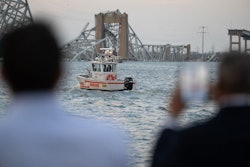The Baltimore Port has been closed to ship traffic for more than two days, prompting ocean carriers to seek services at other points along the East Coast.
Baltimore is the third largest port for the import/export of construction equipment and is the largest import/export site for farm equipment and finished passenger vehicles in the country. However, it's the 13th largest container port, isolating the impact of its temporary closure to a few niche segments (flatbed, auto transport, heavy equipment and bulk minerals) that flow into and out of Charm City. Any downstream effects on the wider trucking market are unlikely.
"For the bulk of the market, I do not think that a temporary closure – or even a longer-term closure, frankly – of the port will have much effect other than some logistical hassles or additional road transport to alternate ports," said Avery Vise, vice president of trucking for FTR Transportation Intelligence, adding that either way, "that’s basically a local issue."
Almost 5,000 trucks daily crossed the Francis Scott Key Bridge, which was struck by a container ship in distress during the pre-dawn hours Tuesday and crashed into the Patapsco River seconds later, presumably killing six construction workers.
The biggest indirect consequence to otherwise unaffected carriers is likely to be traffic congestion, again, localized to the immediately affected areas – namely the now missing 1.6 mile section of Interstate 695.
"But I doubt there would be enough volume in a concentrated area to move the needle," Vise said. "Moreover, other truckers likely could navigate around bottlenecks. There might be some reduced freight volume due to closure or greatly reduced activity of businesses that depend on port operations for commerce, but that would not have a meaningful impact for a carrier unless one or more of those businesses happens to be a major customer."
Any of the delays would likely easily be absorbed by excess capacity already in the truckload market, said DAT Freight & Analytics Principal Analyst Dean Croke.










